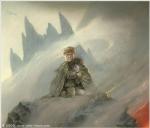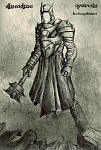Wry said:
I also feel that it's not really fair to compare his world to say erikson or martin, for the simple reason that they have built their world through telling their story (which they aren't finished yet), not through having reams of notes post-humously published. if you take the lord of the rings alone, then Tolkiens world would seem less impressive.
This is true in a way, but I think that the difference is even more fundamental, and that this fundamental difference
requires the inclusion of Tolkien's other work in any consideration of the world he created. And that difference is that the world, not the story, was Tolkiens primary creation. For most authors their notes are just things that they might one day include in their stories, but for Tolkien it was different... and indeed, they were often not so much notes as essays. I think that Tolkien's world feels more real because in a sense, to Tolkien, it was real. I don't mean that in any mystical sort of way, but to reiterate that for Tolkien the world came first, it had an integrity of its own that was not subservient to the stories set in it.
However, I do not think that it is in any way a criticism of other authors to say that they have a world less deep that Tolkien's, because it's obvious that their goals and Tolkien's are not the same. As I said in the other thread, I do not think that anyone has created a world to equal Tolkien's because I don't think that anybody has tried - their focus is on other things, and they have no need of such a world. In this sense they should not be compared - their
merit should not be compared to Tolkien's. A dictionary cannot be criticised because it only
defines 'pie' without telling you how to make one. But it is still true to say that the cookbook is better for recipes.
polishgenius said:
What I'd say is that although in some ways, Tolkien's building was unrivalled, people need to be as wary of unequivocly stating that there's no equal to it as of comparing any half-decent fantasty to his work.
This is true. While the fact that fans of many authors make the same comparisons to Tolkien may give some discredit to such claims, it does not mean that one or more of them might not in fact be correct. But I do think that the burden is then on that person to say why that particular author really is better in that respect.
I can agree with some of the rest of what you're saying, if not your last line, but still not entirely. It perhaps gets back to the question of what makes for good world building, which I cannot presume to offer a definitive answer to. But I don't think it's to be found in a profusion of semi-arbitrary minutiae. In Tolkien's writing there are such layers and depth... any custom you come across in Middle-earth, there's probably an essay somewhere explaining why it originated and how it's evolved to its present form over time. I've not read Mieville though (and have been a little put off trying), so cannot offer any thoughts on that comparison... but maybe one of these days

.
astra_lestat said:
and here is my post from the topic, which is basically exactly the same as you yours
Well, great minds think alike! Or is it fools seldom differ? I always get those mixed up

. But thanks for the link, not quite the same topic but an interesting read.
Mi... uh, on Aimless, said:
Aneirin, I just don't feel this discussion will be meaningful unless we're all clear on the criteria we're using.
Agreed... although I think, in part, the discussion is
about the criteria. It's obviously not for me to set down some definition of good world building to then try and moderate the debate by.
Quote
Tolkien's writing is probably unsurpassed in many ways, but Erikson has his anthropology and archaeology working for him, and I love that. Herbert has the mythos and the scifi approach. Every writer that's been mentioned so far has focused especially much on some aspects and less on others.
Again I agree, but I think that on a higher level the world *is* what Tolkien focused on while most other authors focus on the story. While this does not in itself inevitably make for a better world, I think that in the case of Tolkien it's a large part of what does. Middle earth lore was created over the span of decades, and was brought into being almost for its own sake, rather than to prop up a story. Tolkien was writing for himself and for fellow academics of mythology and language, rather than for the entertainment of the masses, which gave an enormous integrity to his writing.
Mythology was Tolkien's field of expertise, and he drew greatly on this in creating the world that he did - not just in creating a mythology for Middle-earth but in creating Middle-earth *as* a mythology. Erikson likewise has his anthropology and archaeology, which is probably a very large part of what makes his world one of the best among the modern fantasy writers, but I don't think he uses his expertise to the same extent or same ends that Tolkien did his. It comes across more in the events of the book and in some facets of the history than in the development of the world as a whole. I think one of Erikson's strengths could be said to be the fall of empires, and their remnants, but for all that it adds to the story and the history it does not make for the completeness of Tolkien's world.

 Help
Help
















